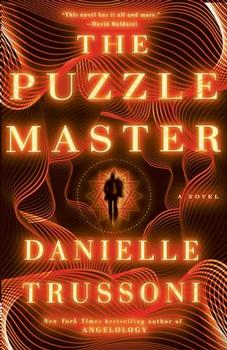Summary | Excerpt | Reviews | Beyond the Book | Readalikes | Genres & Themes | Author Bio

A Novel
by Danielle Trussoni
Brink parked in the shade, filled a plastic bowl with water for Connie, scratched her behind her long, soft ears, and plugged a portable fan into the truck's cigarette lighter, cracking the window so she'd be comfortable. Normally he wouldn't leave her alone, but he wouldn't be gone long, and the mountain air was cool, nothing like the heavy wet heat of Manhattan. "Be right back," he said, and headed to the prison.
At the main entrance, he paused at the security station, dropped his messenger bag into a plastic bin, showed his driver's license and vaccination card to a guard, and walked through a metal detector. He'd been given prior approval to bring his bag—which held his laptop, his phone, and a notebook and pen—and was relieved that the guards didn't try to take it.
A woman in a loose navy-blue dress stood waiting. She was tall and thin with dark-brown eyes, dark skin, and hair cut in a bob. She introduced herself as Dr. Thessaly Moses, the head psychologist.
He didn't need to introduce himself. Clearly, she'd googled him. Still, she stared at him a bit too long, and he knew she was surprised by his appearance. He was six foot one and athletic, lean and strong and (as he'd been told) handsome, not at all what people expected of (as his mom sometimes teased) "a puzzle geek." He wore his favorite red Converse All Stars, black Levi's, and a sports jacket over a T-shirt that read somebody do something.
Aside from photos, a Mike Brink Google search would have brought up a video clip of his remote Zoom-in appearance on The Late Show with Stephen Colbert, recorded during the 2020 pandemic lockdown. He'd taken Colbert on a tour of his puzzle library and opened one of his Japanese puzzle boxes, which inspired a joke about sushi. There would be a Wikipedia page that linked to the New York Times Games page, where he was a regular constructor; a list of the puzzle competitions he'd won; and a link to a Vanity Fair profile that gave his entire life story: the normal Midwestern childhood, the tragic accident that had altered his brain, and the miraculous gift that had appeared in its wake.
"Thank you for coming so quickly," she said. "I would've driven down to the city, but I couldn't leave my patients."
"You've definitely made me curious," he said. "From your description, it seems pretty unusual."
"I don't understand it at all, to be perfectly honest with you," she said. "But if anyone can shed light on this, it's you."
Her faith in his abilities worried him. As his fame as a puzzle solver grew, people often assumed Mike Brink possessed a superhuman gift. Not just an ability to recite fifteen thousand pi places, or the talent to create a vicious crossword, but the power to read the future. But he didn't have superpowers, and he couldn't do the impossible. He was a regular guy with a singular gift—"an island of genius," as his doctor called it. The best he could do was give it a try.
"You have it with you?" he asked, noticing a folder under her arm.
"If you come this way, we can talk in private," Dr. Moses said, gesturing for Brink to follow her through a hallway.
Although he knew the prison had been created in a different mold than modern facilities, part of him had expected cement-block cells and barred windows, all the images he'd seen in movies. Instead, Dr. Moses led the way through a calm, almost pleasant space, institutional—the windows were reinforced—but human. There were potted trees near the metal detectors, art on the walls, and carpeting in the hallway. The bones of the tuberculosis sanatorium had been adapted to contemporary incarceration in the way that an old church might be adapted to a Zen meditation center: The symbols and decor had changed, but the essential structure remained the same.
She ushered him into her bright, stylish office, closing the door after him. He stood in a meticulously organized space: an immaculate desk, color-coded binders on a shelf, a Mac desktop, all perfectly uninteresting until his eye fell upon a Rubik's Cube sitting on the windowsill. It was a newer model, the cubies in plastic as opposed to stickers, a mix of blue, green, yellow, orange, red, and white. The cubies were scrambled in a way that showed regular unsuccessful attempts to solve it, weeks, perhaps months, of twists and turns as someone—Thessaly Moses, he assumed—strained to put the six color fields into alignment. He drummed his fingers against his thigh, nervous energy shooting through him. Just seeing the cube in that state of disorder filled him with an overwhelming need to put it right.
Excerpted from The Puzzle Master by Danielle Trussoni. Copyright © 2023 by Danielle Trussoni. All rights reserved. No part of this excerpt may be reproduced or reprinted without permission in writing from the publisher.
Your guide toexceptional books
BookBrowse seeks out and recommends the best in contemporary fiction and nonfiction—books that not only engage and entertain but also deepen our understanding of ourselves and the world around us.